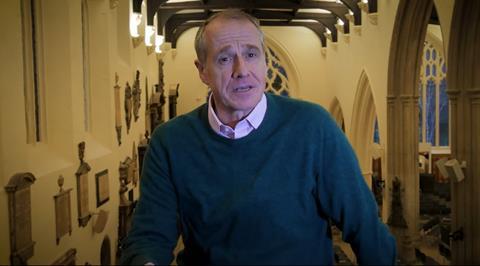St Helen’s Bishopsgate has become the latest high profile CofE church to announce it is breaking from the House of Bishops over same sex relationships. In a video posted on their social media, Rev William Taylor explained their decision, and what comes next. Read the full transcript below

In December 2020, the Parochial Church Council (PCC) at St Helens announced that, as a church, we were in broken partnership with the House of Bishops.
The teaching and action of a number of bishops in the Church of England with regards to marriage and human sexuality, together with our own bishop’s unwillingness to publically speak against this teaching and action, caused this broken partnership.
Recently, the Bishop of London has confirmed her views through speeches at General Synod and in answer to questions at press conferences and on national radio. Her statement, that the Church is silent on the matter of sexual activity in same sex relationships, is not silence. It speaks volumes.
Walking away
I will not again rehearse the biblical and pastoral reasons for our position; it is suffice to say that St Helen’s congregation sits under the authority of God’s word, and will continue to uphold the Bible’s teaching on marriage and sex as the only route to true spiritual health and genuine human flourishing.
The bishops have exalted their desire for an institutional political consensus above the authority of Jesus’s word
We believe that this failure of the House of Bishops to uphold God’s teaching on marriage and sexuality requires a clear and public distinction between ourselves and those who, by their words and actions, deny the authority of God’s word, and walk away from the teaching of the Lord Jesus.
The bishops of the Church of England have walked away from us. By contrast, we will continue to walk in closer union with those who uphold the teaching of God’s word, and will actively develop stronger gospel partnerships with them.
The House of Bishops have chosen to walk apart. And, in doing so, they have created a major crisis - for themselves and for the numerous churches they have been consecrated to serve.
Institutional compromise
This crisis derives from a false understanding of Christian unity. When Jesus prayed for unity for his disciples in his famous prayer in John 17, the unity he prayed for was one that comes through belief in him, through the words of the apostles, not a false unity of institutional compromise.
He said, “I pray for those who will believe in me through their” - that is, the apostle’s - “words” (v20). So abandon the apostolic word, and there is no Christian unity. There’s no Christian Church, only a manmade consensus and humanly contrived corporate structure.
The bishops have exalted their desire for an institutional political consensus above the authority of Jesus’s word. And, as a result, they have walked away from the true Church of God.
Imperialistic views
Despite the very substantial minority vote in the House of Clergy and Laity - 40 to 45 per cent against - the bishops seem determined to persist with their proposals, exalting their own views above a very substantial minority of those who cannot accept it. Leadership cannot be deemed effective when vast sways refuse to follow.
Furthermore, the readiness of the House of Bishops to trample, imperialistically, in White, Western boots, over the biblical convictions of the vast majority of Anglicans worldwide, has caused deep distress among our own global majority-heritage members at St Helens, just as it has appalled Anglicans worldwide.
My aim is now to secure faithful Anglican evangelical ministry in London for the future
Multiple provinces of the Global South Anglican Church, representing 75 per cent of Anglicans worldwide, now no longer recognise or walk with the leadership of the Archbishop of Canterbury. This threatens to leave the Church of England, as Isaiah might put it, like a derelict shed in a field of turnips.
It is not too late for the House of Bishops to withdraw all of these unbiblical proposals and ill-advised initiatives. To do so would demonstrate true humility and genuine leadership. They would, once again, be able to walk together with God’s people. Without that, the direction of travel is sadly clear.
Safeguarding the future
Here at St Helens, we have five Sunday congregations and a number of additional midweek ministries. The vast majority of those in these congregations and ministries are under 40 years of age. Our electoral roll has over 1,200 people, of whom 300, at least, are from global majority-heritage background.
Our eleven to 18-year-olds group has around 120 in regular attendance. Here, we find young men and women seeking to live godly lives in accordance with God’s word in a highly sexualised culture. A number of the youth group lead Christian Unions at their own schools, in face of considerable opposition from secular teachers.
As a result of the crisis that the House of Bishops has brought about, these young men and women now need concrete structural solutions that safeguard their future in the Church of England. For this reason, my aim - and the aim of the clergy and PCC at St Helens - is now to secure faithful Anglican evangelical ministry in London for the future.
Next steps
In the short term, we’ve taken a number of steps, even as we await the House of Bishops revised proposals for the July Synod. The PCC has pressed pause on financial contributions to the Church of England.
Those clergy who have completed their training have written to me, stating that they can no longer walk together with bishops who have walked away from them. Our curates in training have felt forced to withdraw from the Holy Week meetings with the Bishop of London. An ordinand, due to be ordained for ministry at St. Helens this summer, has felt forced to withdraw from the ordination process.
Leadership cannot be deemed effective when vast sways refuse to follow
Archbishop Foley Beach, chair of GAFCON (Global Anglican Future Conference) and leader of the Anglican Church of North America, has offered to make provision for the annual clergy review process at St Helens. He will be in London in March, where he will meet with leaders of churches in London and Southwark diocese. There will be other archbishops and bishops from GAFCON, and from the Global South, who visit London in the coming months.
Without bishops, not limited geographically to any particular area, nor restricted in authority, diocesan in nature and jurisdiction, clearly not walking together with the House of Bishops of the Church of England, with the authority to ordain, licence and install Church of England ministers to Church of England livings, and to consecrate further bishops, there can be no long term security for Church of England evangelical churches or clergy.
So my aim now, and for so long as I remain at St Helens, together with the PCC and other clergy and senior leaders here, will be to secure the future of Anglican evangelical ministry in London. We would love to do this within the Church of England. Anglican bishops and archbishops from across the globe are ready to help us. We do not stand alone


































